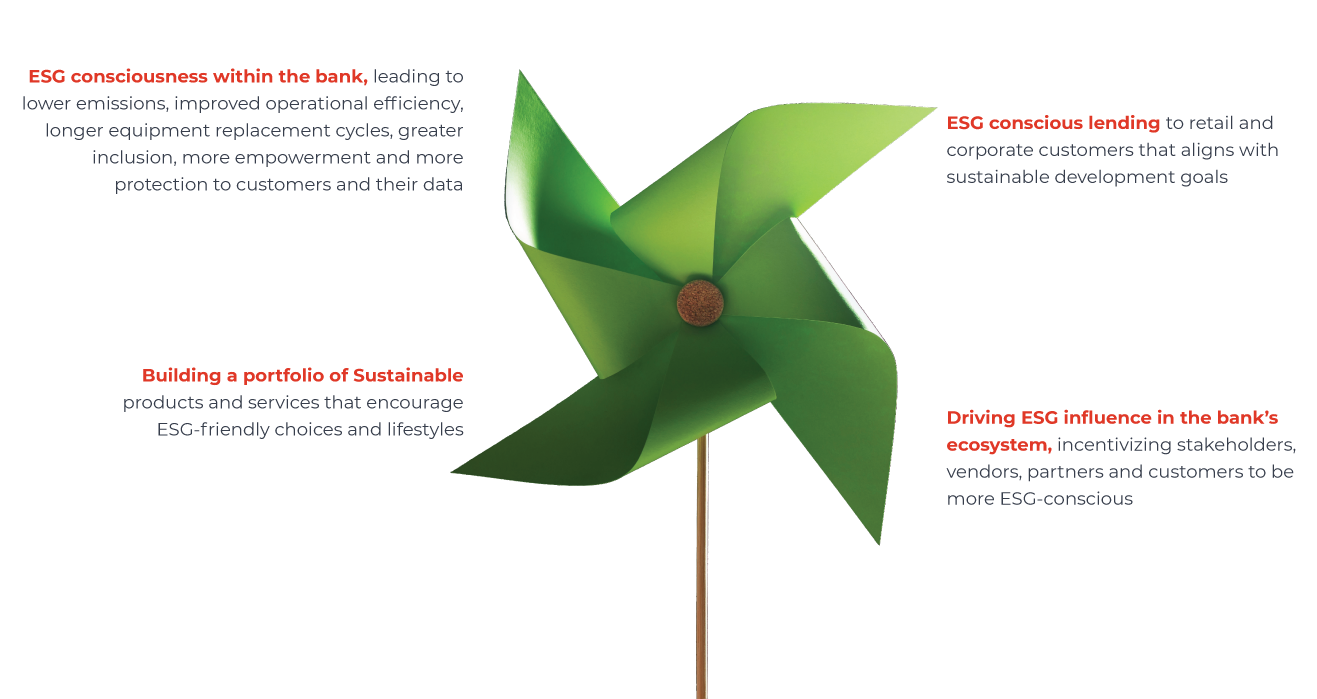ESG conscious banking: an opportunity to do good and do well
For centuries, Banks have catalyzed social change and evolution. Today, as the world grapples with climate change, inclusion, social justice and institutional accountability, banks once again have the opportunity to power the next revolution – the ESG revolution. While most banks have a formal ESG strategy, we believe that ESG consciousness is not just about doing good, but also about doing well. ESG-conscious banking should create new and future-proof value streams to build a sustainable and resilient business.

7 compelling reasons why banks should focus on ESG

1. An emerging opportunity: Sustainable finance and ESG-conscious lending are now mainstream business segments, offering advantages to early movers.
2. Regulation is imminent: Banks start building a strong ESG-conscious loan book and embracing high standards of ESG reporting immediately, will stand to gain an early mover advantage.
3. Mitigate portfolio risk: With a strong ESG-centric lending policy in place, banks can capitalize on emerging global opportunities to mitigate their lending portfolio risk.
4. New revenue streams: Banks can create new revenue streams through ESG-focused products and services, benefiting clients in addressing ESG shortfalls.
5. Access ‘green’ capital: Banks with a proven ESG lending track record gain preferential access to ‘green’ capital, boosting investor confidence in the future.
6. Growth and valuation: ESG-consciousness leads to better decision-making, risk mitigation, and long-term sustainability, driving growth and valuation.
7. Positive impact on reputation: ESG’s positive impact on corporate reputation directly influences business valuation, crucial for sectors like banking reliant on trust and goodwill.
4 areas where banks can drive ESG consciousness, profitably:

ESG consciousness within the bank, leading to lower emissions, improved operational efficiency, longer equipment replacement cycles, greater inclusion, more empowerment and more protection to customers and their data
Building a portfolio of Sustainable products and services that encourage ESG-friendly choices and lifestyles

ESG conscious lending to retail and corporate customers that aligns with sustainable development goals
Driving ESG influence in the bank’s ecosystem, incentivizing stakeholders, vendors, partners and customers to be more ESG-conscious
How Finacle solutions help create ESG impact profitably:
With Finacle solutions you can Recompose your bank’s business model to create value and drive sustainability
 |
 |
 |
 |
 |
 |
|
| Technology | Cloud | End-to-end digitization | Real-time payments | APIs and Webhooks | Digital product factories | Identity management |
| Demand side business drivers | Scale and elasticity | Customer-driven demand for digital self-service and fully digital customer journeys | Shift towards lowcash/ cashless societies | Need for ‘invisible’ banking – integrated into customer journeys | Need for tailored, personalised and segment-specific products | Need easy and seamless access to wide array of financial services |
| Supply side business drivers | Significant drop in cloud computing costs | Cost advantage and end-to-end visibility of customer journey | Cost and resource efficiency of digital payments | New ecosystems, BaaS and Embedded finance opportunities | Competitive pressures to be innovative and firstto-market | Data protection and centralised management |
| ESG impact | Lower energy consumption Zero emissions (carbon offset by cloud providers) |
Paperless operations Fuel and space savings |
Lower energy consumption Lower paper usage Improved access to opportunities |
Wider spectrum of banking services to underbanked | Address previously ignored/ underserved segments | Better financial protection |
Finacle’s ESG impact in the world:
Touching a billion lives every day
A planet scale platform that powers
Over 1.7 bn+ digital accounts across the world
Impacting over 1.3 billion lives world-wide
Banks running on Finacle process over 50 billion real time payments each year,
saving over 5 mn trees
25 billion liters of water
through paperless operations
By migrating a majority of their operations workload to cloud, banks can realize
Up to 93% reduction in energy consumption
reduction in workload carbon footprint by 88%
using public, private and hybrid cloud solutions
Banks running on Finacle on an average realize
33% higher return-on-assets
19% higher return-on-capital
3.9% lower cost-to-income ratio
compared to peers
Between 2017 to 2022, India witnessed a 30% rise in its Financial inclusion index, driven by banking digitalization. 60% of all Indian banks run on Finacle and have been pivotal in driving financial inclusion in the country
Infosys is an ESG pioneer that has always led in thought and action when it comes to corporate governance, CSR practices and environmental consciousness. With many firsts and awards to our name, we enjoy the distinction of being a net zero company in 2020, 30 years ahead of Paris agreement targets.



